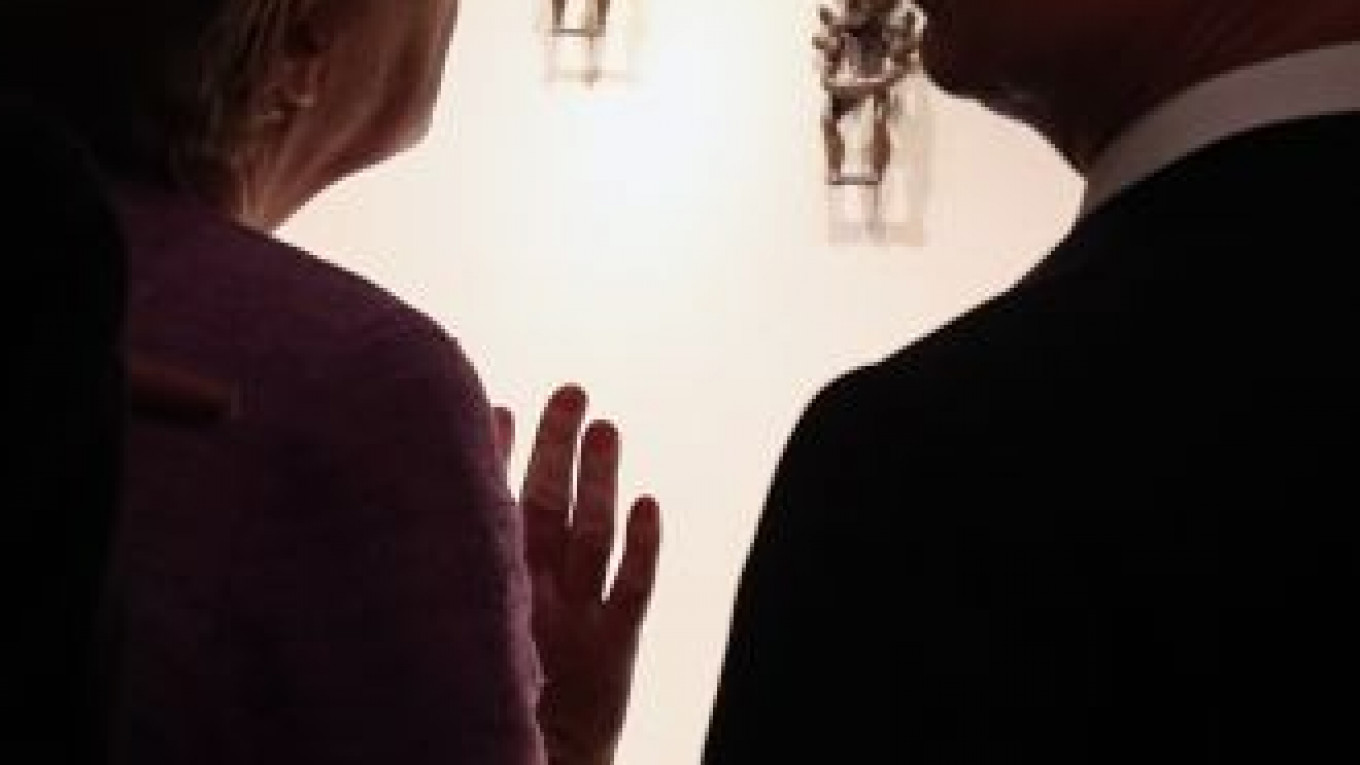ST. PETERSBURG — Chancellor Angela Merkel told President Vladimir Putin that German art seized by the Soviets in the wake of World War II should be repatriated to Germany, a claim that Putin swiftly rejected.
The tense exchange took place as they opened an exhibition at the Hermitage museum in St. Petersburg. The exhibition about the Bronze Age includes 600 items carried off by the Soviet Union as war reparations, according to the German government.
Merkel said it was an important step that the works were now going on public display for the first time.
"It's our opinion that these exhibition pieces should be returned to Germany," she said Friday.
Putin replied that it was time to stop making repatriation claims against each other, otherwise Turkey could also demand the return of art from Germany. He said it did not matter to the average citizen if art s displayed in Berlin, St. Petersburg, Moscow or in Turkey.
According to Berlin's Humboldt University, the Soviets plundered more than a million books and thousands of works of art at the end of the war. Many pieces have still not been traced, and it remains a touchy issue in both countries.
The Hermitage exhibition, "The Bronze Age of Europe: Europe Without Borders," opened to the public on Saturday, the anniversary of the Nazi invasion of the Soviet Union. According to the Hermitage website, the exhibition includes items from a collection known as Priam's Treasure, which were discovered by German archaeologist Heinrich Schliemann in the 19th century.
Earlier Friday it had looked as if Merkel's trip to Russia was going to be eclipsed by a spat over the museum event when a German government spokesman in Berlin, Georg Streiter, said Russia had called off the event, arguing that "it was impossible for the host to find the time." German media seized quickly upon the apparent last-minute change of schedule as a likely sign of deteriorating relations between the two countries, proclaiming an "Uproar about looted art" and writing that "Putin is a miserable diplomat."
But Putin later dismissed the speculation of a bust-up and said the museum trip was going ahead. He said there had been some uncertainty over whether there would be time for the event.
Merkel was in Russia to address an economic forum in St. Petersburg hosted by Putin.
Addressing the issue of repatriating artworks, Putin said earlier: "I think this is a very sensitive question for civil societies in both countries. … So if we want any progress, we should not blow the problem out of proportion but seek ways to solve it.
"Probably we should not start a discussion now because people will appear on the Russian side who would evaluate the damage done to our art during World War II," he added.
Tension between Berlin and Moscow was apparent when Putin visited the Hanover trade fair in April.
Merkel, who grew up in communist East Germany, criticized Russian government pressure on foreign-funded nongovernmental organizations, saying: "A lively civil society can only emerge when individuals can operate without fear or worry, of course, on the basis of law."
Her foreign minister, the openly gay Guido Westerwelle, has also protested about a new law against homosexual "propaganda."
But Germany has to keep up good ties with Russia because of its dependency on Russian natural gas. Merkel says maintaining a dialogue is the best way to improve civil rights in Russia.
A Message from The Moscow Times:
Dear readers,
We are facing unprecedented challenges. Russia's Prosecutor General's Office has designated The Moscow Times as an "undesirable" organization, criminalizing our work and putting our staff at risk of prosecution. This follows our earlier unjust labeling as a "foreign agent."
These actions are direct attempts to silence independent journalism in Russia. The authorities claim our work "discredits the decisions of the Russian leadership." We see things differently: we strive to provide accurate, unbiased reporting on Russia.
We, the journalists of The Moscow Times, refuse to be silenced. But to continue our work, we need your help.
Your support, no matter how small, makes a world of difference. If you can, please support us monthly starting from just $2. It's quick to set up, and every contribution makes a significant impact.
By supporting The Moscow Times, you're defending open, independent journalism in the face of repression. Thank you for standing with us.
Remind me later.






